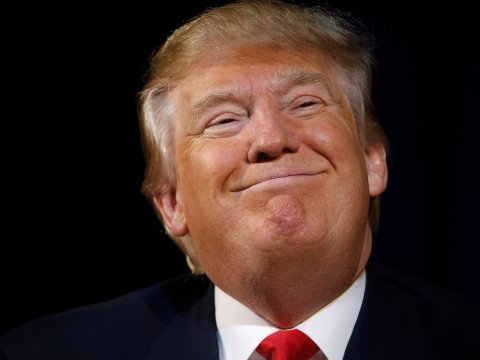Posted on January
30, 2017
This Means Wall
Trump defines border, redefines terms
by
Daniel
Clark
To hear the national media tell it, President Trump
made good on his promise to build a border wall, just by saying so during an executive
order signing ceremony. The inability of
a president to unilaterally initiate such a project has done little to disrupt
that story line.
In fact, the legislative authority for Trump’s order
comes from the Secure Fence Act of 2006, which, as its title suggests,
authorizes the construction of a high double fence – not a wall – along our
Southern border. So how does the
president get away with claiming this law as a legal basis for building a wall? He simply added a clause to the “definitions”
section of his order that says, “’Wall’ shall mean a contiguous, physical wall
or other similarly secure, contiguous and impassible physical barrier.”
When he says “wall,” then, he means either a wall, or
something that can serve a similar purpose – like a fence, for instance. In fact, he foreshadowed this redefinition at
a press conference two weeks earlier, when he made reference to “the fence,”
and then interrupted himself and said, “It’s not a fence; it’s a wall.” It really isn’t, of  course. If it were, he wouldn’t have to expand the
word’s definition.
course. If it were, he wouldn’t have to expand the
word’s definition.
What Trump is actually ordering – the completion of
the border fence that was mandated more than a decade ago – is undoubtedly the
right thing to do. We need to secure our
border, but the only thing to be gained by building a wall instead of a fence
is bigger budget deficits. All’s well
that ends well, one might say, so why not indulge him in his claim to have paid
off on a major campaign promise?
Well, there’s the small matter of its being untrue,
for those who still care about that sort of thing. Until last fall, conservatives had always
been stalwart defenders of the concept of an objective truth. Now that they feel the need to defend Trump,
many leading conservatives are starting to embrace the liberal philosophy that
there is no truth, but there are only competing narratives. It’s not enough to thank the president for
his commitment to border security, while also pointing out that a fence is not
a wall. No, the point is that Trump has
succeeded in establishing the narrative that he’s building a wall, therefore we
must call it a wall.
Never mind that one reason that narrative has
prevailed is because that’s what his liberal critics want to believe. The media have agreed to call the fence a
wall not because they take Trump’s word for it, but because they want to
demagogue the issue, by depicting a perfectly innocent and necessary security measure
as if it were characteristic of a police state.
 The
current issue of Time magazine, for
instance, features a totally irresponsible article likening our proposed border
fence to the Berlin Wall, as if the structure itself was of negative moral
value, without regard for the motivation for its construction.
The
current issue of Time magazine, for
instance, features a totally irresponsible article likening our proposed border
fence to the Berlin Wall, as if the structure itself was of negative moral
value, without regard for the motivation for its construction.
If the ethical imperative of accepting objective truths
over prevailing narratives isn’t plain enough, conservatives never know whether
the next Trump narrative will be to their liking. Consider, for example, his ludicrous
assertion that he will “make Mexico pay for the wall.” Trump’s surrogates are floating the idea that
this payment will take the form of a 20 percent tariff on all imports from
Mexico. Putting aside the unlikelihood
of his actually imposing this tariff, in no way could that truthfully be
considered payment by Mexico.
What if he officially declared that “Mexico” means
either Mexico, or all U.S. citizens who purchase goods from that country? Many Democrats favor high tariffs, and might
be happy to help Trump establish the narrative that Mexico was footing the
bill. How would conservative pundits and
radio hosts react? Would they support
the narrative by gloating that Trump had fulfilled another promise, or would
they rediscover the value of truth?
Selective application of truth is hardly better than
denying it altogether. If we accept that
any stationary physical impediment equals a wall; if we argue that Trump never
mocked a handicapped reporter, even though he prefaced his impression with the
words, “The poor guy, you’ve gotta see this guy”; if
we insist that the famously defunct Trump Steaks still exist, just because
Trump appeared on stage next to a pile of meat, then why should we be believed
when we point out that a massive tax on American consumers is not being paid by
Mexico?
The Shinbone: The
Frontier of the Free Press